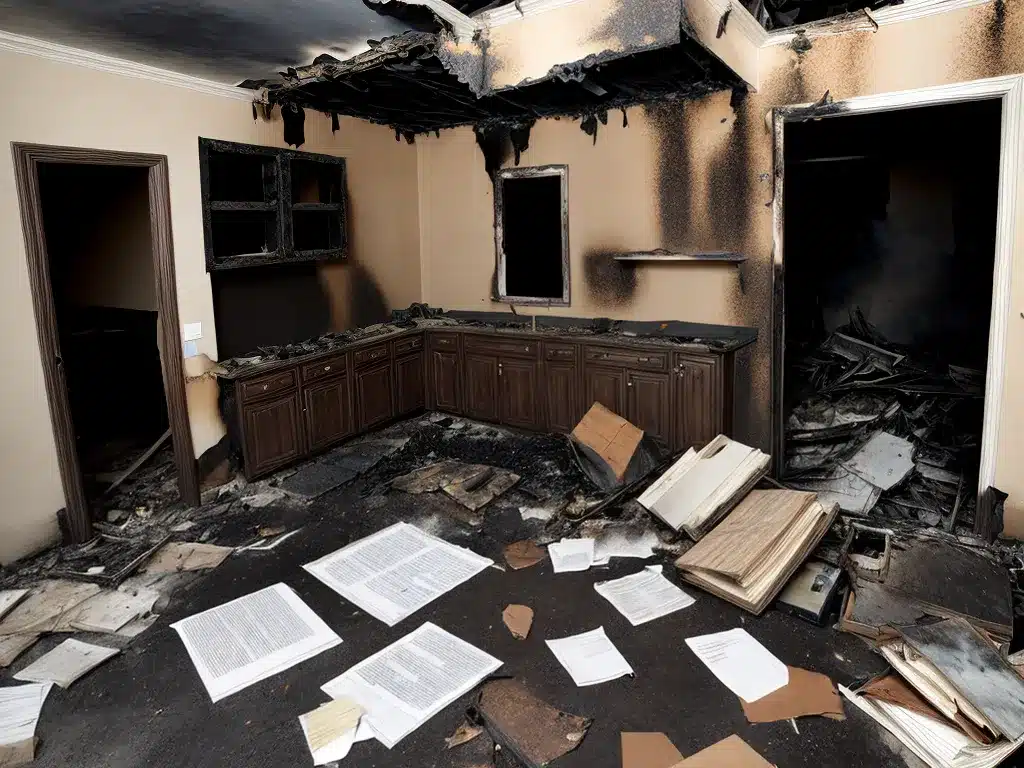
Introduction
A house fire or flood can be extremely traumatic, both emotionally and financially. Often, important documents like birth certificates, passports, insurance policies, and financial records are damaged or destroyed. Recovering these documents is crucial for getting your life back in order. In this article, I will provide an in-depth guide on recovering important documents after a disaster.
Assess Damage and Salvage What You Can
The first step is to assess the damage and salvage whatever documents you can. Be extremely careful when entering a damaged building as there may be structural damage.
- Wear protective gear like a mask, boots, gloves, and goggles. Smoke and soot can be hazardous.
- Bring flashlights to search for documents in dark areas.
- Look through debris carefully but do not disturb the area too much. This is still an active investigation site.
- If documents are wet, do not try to peel them apart. Place them in sealable plastic bags and put them in the freezer to dry.
- If documents are dry but dirty, try vacuuming off the dirt.
- Photograph any documents you find for insurance claims.
Focus your search on commonly stored important documents like:
- Passports
- Birth certificates
- Social Security cards
- Insurance policies
- Vehicle titles
- Financial statements
- Wills, trusts, and estate documents
Even partially damaged documents may still contain valuable information.
Contact Institutions to Replace Documents
For any destroyed important documents, contact the issuing institutions to replace them. Here are some key documents and who to contact:
- Passport – Contact the State Department
- Birth Certificate – Contact the Office of Vital Records in the state you were born
- Social Security Card – Contact the Social Security Administration
- Driver’s License – Go to your local DMV office
- Insurance Policies – Contact your insurance agent or company
- Bank Account Records – Contact your bank
- 401k, IRA, Investment Accounts – Contact the financial institution
- Medical Records – Contact your healthcare providers
Many institutions have a simple application process to replace documents, usually requiring a small fee. Provide as much information as possible like your full legal name, date of birth, Social Security number, and current address.
Reconstruct Financial and Legal Records
Reconstructing financial and legal records will take more effort. Here are some tips:
- Tax returns – Order transcripts from the IRS with Form 4506
- Property deeds – Check county clerk records to obtain copies
- Auto titles – Contact your DMV to obtain replacements
- Wills and trusts – Have your attorney draft new documents
- Business contracts – Contact the other parties to request new copies
- Financial statements – Contact your bank and financial institutions
- Loan documents – Contact lenders for any active loans
Compile replacement documents in a structured format like binders or file folders. This will help when providing records to insurance companies, government agencies, and financial institutions.
Use Online Accounts and Backups
Many important records and documents are now stored online or backed up remotely.
- Log into email accounts to retrieve e-statements, financial records, and legal documents sent online.
- Access cloud storage like Google Drive or Dropbox which may contain backups.
- Download transactions from banking and retirement accounts.
- Review social media accounts and photos as additional records.
Also contact service providers about recovering data from damaged phones, computers, and storage devices. They may be able to extract data from water-damaged electronics.
Notify Key Parties
Once you start recovering information, notify important parties:
- Banks and creditors – Report damaged credit/debit cards, checks, account statements
- Insurance companies – File housing and auto claims with documentation
- Employers – Request replacement tax forms like W2s
- Health providers – Request copies of medical records
- Government agencies – Update records with SSA, IRS, DMV etc.
This will prevent identity theft or fraudulent activity. Send copies of any police reports about the fire/flood.
Summary
Recovering important documents after a disaster requires time and persistence. Search your damaged property thoroughly, contact institutions for replacements, reconstruct records, access online backups, and notify key parties. While the process is frustrating, getting your identity and records restored is critical to rebuilding your life.












